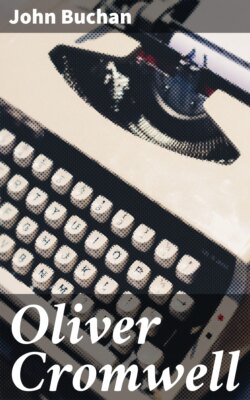Читать книгу Oliver Cromwell - John Buchan - Страница 25
На сайте Литреса книга снята с продажи.
Chapter IV
THE APPROACH OF WAR
(1640-1642)
ОглавлениеTable of Contents
Forasmuch as we do find that hardly within the memory of all times can be shewed forth a fit example or precedent of the work we have in hand, we thought ourselves so much the more bound to resort to the infallible and original ground of nature and common reason, and, freeing ourselves from the leading or misleading of examples, to insist and fix our considerations upon the individual business in hand, without wandering or discourse.
Bacon, Preface to the Articles of Union of England and Scotland.
The tale of the Short Parliament is soon told. Most of 1640the members were new, and they accepted at once the leadership of Pym. Charles had hoped that his evidence of Scottish intrigues with France would rouse the nationalism of Englishmen, but the House refused to be interested, and turned resolutely to the grievances which had been maturing during the long recess. It was a grave and businesslike and still a moderate assembly, and its proceedings gave Lord Falkland, a new member, “such a reverence for parliaments that he thought it really impossible that they could ever produce mischief or inconvenience to the kingdom, or that the kingdom could be tolerably happy in the intermission of them.”[96] Pym’s speech on April 17th, the greatest he ever delivered, expounded soberly the case for reform—the offences against the liberty and privilege of parliament and the liberty and the property of the citizens, and the doings of Laud and his ecclesiastical courts.[97] The king demanded subsidies before he would consider grievances, not unnaturally perhaps, considering that he was on the verge of war. Finding the House resolute, 1640 he dissolved it suddenly on May 5 after a three weeks’ session. The irritation of the members was not allayed by the fact that Convocation went on sitting and granting subsidies from the clergy. “It must be worse before it can be better,” St John grimly told Hyde. “They must now be of another temper; they must not only sweep the house clean below, but must pull down all the cobwebs which hang in the top and corners.”
Charles turned to the malcontents in the north. The parliament held in June in Edinburgh openly decreed revolution, a committee of public safety was appointed, and in July Leslie was on the march. Wentworth, summoned from Ireland and made Earl of Strafford, found the tools breaking in his hand. “Pity me,” he wrote to a friend, “for never came any man to so bad a business.” On August 28th Leslie defeated the king’s army at Newburn on the Tyne and next day received the town of Newcastle’s surrender. The rejoicings in London after this English defeat warned Charles of the unpopularity of the war, against which twelve peers had already petitioned.[98] He adopted the ancient device of summoning a great council of peers to meet at York, but the general sense of the council was with the petitioners, while Pym and his followers were known to be deep in the confidence of the Scots. His exchequer was empty, his army was a rabble, and he was compelled to bow to the inevitable. The treaty of Ripon patched up a temporary peace, and writs were issued for a new parliament.
